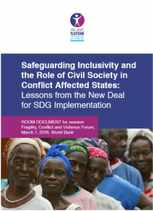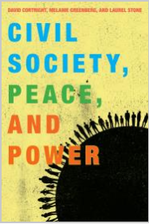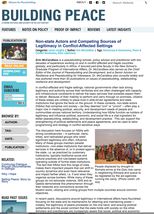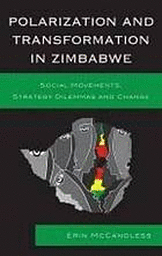On Civil Society & Social Movements

George Floyd: The eyes of the world are watching now
with Mary Hope Schwoebel
The Daily Maverick (May 2020)
Blog - open access
The global protests over the death of George Floyd will not by themselves create and sustain change — action needs to be taken to change policies and practices, to forge new social contracts that better reflect the principles that we are all sufficiently willing to live by.
with Mary Hope Schwoebel
The Daily Maverick (May 2020)
Blog - open access
The global protests over the death of George Floyd will not by themselves create and sustain change — action needs to be taken to change policies and practices, to forge new social contracts that better reflect the principles that we are all sufficiently willing to live by.

Safeguarding Inclusivity and the Role of Civil Society in Conflict Affected States: Lessons from the New Deal and SDG Implementation
Room document, World Bank's Fragility, Violence and Conflict Forum, 2015
This report examines the nature and role of civil society in countries affected by conflict and fragility with the aim of contributing to policy discussions around inclusivity in peacemaking and peacebuilding processes. It reviews evidence around why inclusivity matters and reflects on lessons around the role of civil society in the New Deal process to date, and, considers potential entry points for ensuring meaningful inclusion of civil society in the effective implementation of Agenda 2030.
Room document, World Bank's Fragility, Violence and Conflict Forum, 2015
This report examines the nature and role of civil society in countries affected by conflict and fragility with the aim of contributing to policy discussions around inclusivity in peacemaking and peacebuilding processes. It reviews evidence around why inclusivity matters and reflects on lessons around the role of civil society in the New Deal process to date, and, considers potential entry points for ensuring meaningful inclusion of civil society in the effective implementation of Agenda 2030.

Civil Society and the 2030 Agenda: Forging a Path to Universal Sustainable Peace through Policy Formulation
In Civil Society, Peace, and Power, eds. D. Cortright, M. Greenberg, L. Stone, 2016
As part of a book project examining civil society's roles in peaceful, just and inclusive societies, this chapter focuses on civil society efforts to influence and shape policy at the highest levels, infusing peace concerns into the ambitious 2030 agenda. The analysis focuses on the strategies that civil society actors have employed - how they maneuvered within existing power structures and capitalised on entry points to influence the process. The chapter reflects on how the process and outcomes of the 2030 agenda move us collectively towards a more universal, sustainable peace, and what further priority actions are needed to facilitate this.
In Civil Society, Peace, and Power, eds. D. Cortright, M. Greenberg, L. Stone, 2016
As part of a book project examining civil society's roles in peaceful, just and inclusive societies, this chapter focuses on civil society efforts to influence and shape policy at the highest levels, infusing peace concerns into the ambitious 2030 agenda. The analysis focuses on the strategies that civil society actors have employed - how they maneuvered within existing power structures and capitalised on entry points to influence the process. The chapter reflects on how the process and outcomes of the 2030 agenda move us collectively towards a more universal, sustainable peace, and what further priority actions are needed to facilitate this.

Non-state Actors and Competing Sources of Legitimacy in Conflict-Affected Settings
“Latest Insights” section of “Building Peace”, Alliance for Peaceuilding's online forum for peace and security.
September 2014
In conflict-affected and fragile settings, national governments often lack strong legitimacy and authority across their territories. They are often challenged by powerful non-state actors that hold high levels of legitimacy with some populations, who may be performing needed services that the state cannot deliver. The article argues the need for greater attention towards engaging concepts, tools and arrangements that hold potential to reconcile competing sources and narratives of legitimacy in support of building and sustaining peaceful states.
“Latest Insights” section of “Building Peace”, Alliance for Peaceuilding's online forum for peace and security.
September 2014
In conflict-affected and fragile settings, national governments often lack strong legitimacy and authority across their territories. They are often challenged by powerful non-state actors that hold high levels of legitimacy with some populations, who may be performing needed services that the state cannot deliver. The article argues the need for greater attention towards engaging concepts, tools and arrangements that hold potential to reconcile competing sources and narratives of legitimacy in support of building and sustaining peaceful states.

Polarization and Transformation in Zimbabwe:
Social Movements, Strategy Dilemmas and Change
Maryland, Lexington Press, 2011 & South Africa: University of Kwazulu-Natal Press, 2011.
Publisher websites: Lexington Books and here - Kwazulu Natal University Press.
This book investigates the issues social movements and civic organisations often face through two social movement organisations in Zimbabwe-the National Constitutional Assembly and the Zimbabwe National War Veterans' Association – and the movements they led to achieve constitutional change and radical land redistribution. Through in-depth case study analysis and peace and conflict impact assessment spanning the years 1997-2010, lessons are drawn for activists, practitioners, policy-makers, and scholars interested in depolarising concepts underpinning polarizing discourses, transcending strategy dilemmas, and understanding how social action can contribute to transformative change and peace.
"This is a major study of Zimbabwean social movements that undercuts any simple binary between 'good' and 'bad' civic players in Zimbabwe politics." – Brian Raftopoulos, Solidarity Peace Trust, South Africa
"This important book addresses the complex nature of social change and conflict transformation, systematically [analysing] the crucial national civil society movements representing concerns of the majority of Zimbabweans."
– Thania Paffenholtz [Inclusive Peace]
Social Movements, Strategy Dilemmas and Change
Maryland, Lexington Press, 2011 & South Africa: University of Kwazulu-Natal Press, 2011.
Publisher websites: Lexington Books and here - Kwazulu Natal University Press.
This book investigates the issues social movements and civic organisations often face through two social movement organisations in Zimbabwe-the National Constitutional Assembly and the Zimbabwe National War Veterans' Association – and the movements they led to achieve constitutional change and radical land redistribution. Through in-depth case study analysis and peace and conflict impact assessment spanning the years 1997-2010, lessons are drawn for activists, practitioners, policy-makers, and scholars interested in depolarising concepts underpinning polarizing discourses, transcending strategy dilemmas, and understanding how social action can contribute to transformative change and peace.
"This is a major study of Zimbabwean social movements that undercuts any simple binary between 'good' and 'bad' civic players in Zimbabwe politics." – Brian Raftopoulos, Solidarity Peace Trust, South Africa
"This important book addresses the complex nature of social change and conflict transformation, systematically [analysing] the crucial national civil society movements representing concerns of the majority of Zimbabweans."
– Thania Paffenholtz [Inclusive Peace]
